#kirby light novels retrospective
Text
Kirby Light Novels Retrospective (Part 1)
Early-installment Weirdness Era.
I sure hope this won't die after part 1!!!
Kirby novels. This weird, weird thing that exists and recently started getting more and more traction among western Kirby fanbase. Despite the series starting in 2013, it didn't get popular (or even translated) in english (at least via fan efforts) until mid-2020. Ever since then, novels started to become essentially our bread and butter during times where HAL wasn't willing to share any game news coming up.
Kirby novels have a lot of great qualities and interesting stuff going on that I would love to dissect. In this retrospective I decided to look over novels in chronological order.
At their best, Kirby Light Novels is genuinely great series of family-friendly books that take it's target audience actually seriously and provide entertaining character writing with engaging world-building and consistent continuity.
At their worst... Well. You'll see.
There's a reason that novels caught the eye of western fans only years later after they first started coming out. And the reason for that being that early novels... Especially the first two are... Rough around the edges, to put it lightly. Let's dive into them then, shall we?
1. The Dangerous Gourmet Mansion (2013)
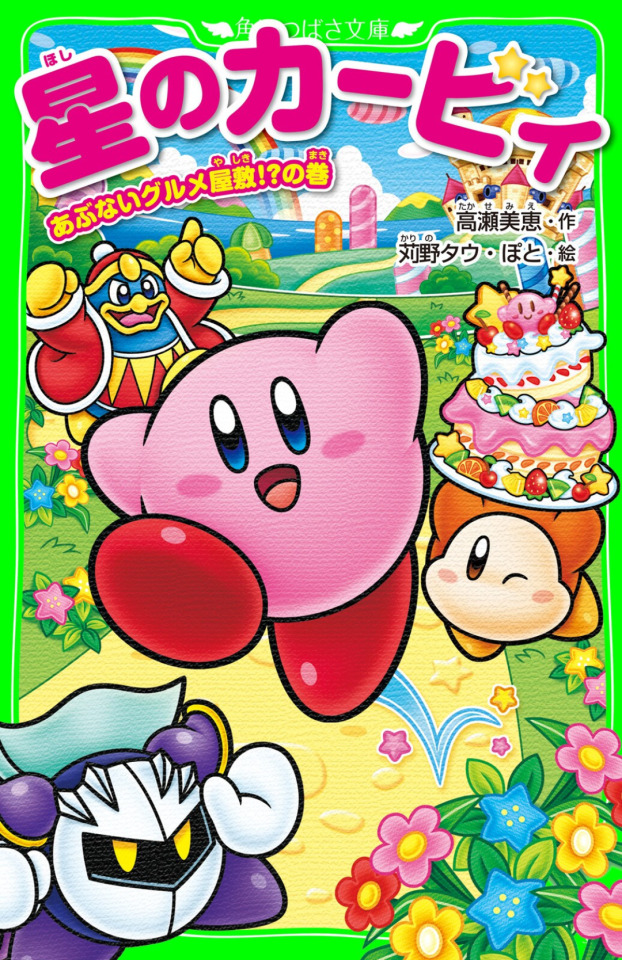
Score: 2/5.
After 00s which was a fairly rough decade for Kirby, franchise started to expand again in early 10s in Japan after few successful game titles in a row. Super Star Ultra (which was at the time the fastest-selling Kirby game upon launch in Japan specifically), Kirby's Epic Yarn, Return to Dream Land: all notable titles that started redefining Kirby as a Nintendo game series force to be reckoned with.
So naturally, a series of light novels launched in 2013. What, it seems random to you? It shouldn't, since light novels based on videogames is fairly common Japanese practice. What is peculiar is that barely any *platformer* series get such luxury.
If you go looking for Mario or Sonic light novels you won't find any, trust me, I looked.
So why Kirby? If I were to assume it's kind of match made in heaven if you think about it. Epic Yarn introduced storybook "motif" into the series, it's full of colorful memorable characters full of personality and fairy-tale like setting that lands itself perfectly to children's book series.
The Mysterious Gourmet Mansion and all novels afterwards were written by Mie Takase. A veteran writer, who worked on many various light novels (including videogame adaptations like Shin Megami Tensei, Ace Attorney, Persona 2 etc) as well as stuff like horror-stories.
In hindsight, it seems like a bit of a random choice, because from my research of her bibliography, she never really wrote anything so specifically children-oriented before. But perhaps her skill and reputation was the reason she was taken for the job. And I mean, hey! This series still goes strong, nearly 10 years later, so it was probably a good choice in the long run.
Doesn't mean that this series didn't need a bit of time before coming into it's own however.
I won't be afraid to say that The Dangerous Gourmet Mansion is kind of. Bad.
Going back to this novel after all the ones that come much later was honestly a trip in itself. It's been almost 2 years since I first read this one so I had memories of few "iconic" moments, but otherwise, I mostly forgot a lot of details. And oh boy, there's a REASON why I forgot a lot of details.
Plot of this novel is remarkably simple --
A rich lady called Mrs. Parfaitski (or how she was "localized" in currently available fan-translation, Mrs. Pairfaitlike) moves to Dream Land and announced a party dedicated to her birthday with a huge feast with a ton of delicious food.
Obviously, Kirby and King Dedede, being huge gluttons they are, want to get to said party, but since the only way to get there is through invitations and neither of them got any, the only way they could get there would be through becoming Meta Knight's "partner", who conveniently got such invitation which can also bring one other person...
Obviously, this leads to Kirby and Dedede stacking together and pretending to be a different person entirely, a woman called Dedeby.
This plan works well (to huge dismay of Meta Knight who got greatly embarrassed during the party due to "Dedeby"), until a conspiracy starts to rear it's head with Chef Kawasaki going missing.
Right off the bat, plot of this novel is super messy. It's a lot of different elements that just don't go well together.
I didn't mention it in my general overview of the story, but novel doesn't jump straight to Meta Knight having invitation, no, first 3 chapters or so are focused on pointless sub-plot of Kirby trying to become one of Parfaitski's chefs to get to the party.
It's a very useless plotline because it does nothing to progress the story nor it does anything to tell us about the characters. Kirby being food-obsessed fanatic who isn't "picky" about what he eats or makes and Waddle Dee being neurotic cautious friend is a dynamic that was apparent ever since their very first interaction in the novel. There was literally No Need for this plotline to happen.
You can argue that this portion of the book exists to establish Kirby and his abilities to new readers. But considering Dedede and Meta Knight for the rest of the book are literally just... There. They don't use any of their fighting skills (hell, I don't think Galaxia even shows up on any of the illustrations until 4th novel, though I might be wrong on that) through out or anything, this argument seems moot since it's not like novel goes out of it's way to establish abilities of every character. Kirby himself demonstrates copy ability in the latter portion of the story where it actually has relevance, which makes this "introductory" portion even more redundant.
One third of the book is essentially filler until Meta Knight comes and SOME semblance of the plot started to get going.
Now, don't get me wrong, Dedeby sub-plot is probably the most entertaining part of the novel, partially due to overall absurdity of the idea of Kirby and Dedede cross-dressing together, but it is, also, is quite useless in grand scheme of things, considering both of them discard this disguise midway through, it never gets brought up again nor it impacts their characterization going forward (it doesn't make them bond or grow together as a team).
Nothing would change if there was some other way they could sneak to the party or even if Meta Knight could just take both of them from the start no problem. It all feels like padding because the actual plot of this novel been resolved in literally 3 chapters. Even then I would argue it didn't need to be 3 chapters since there was a lot of unnecessary fake-outs and build-up towards Wheelie and Lord Kibble being actual "bad guys" of the story, despite Parfaitski being the villain is incredibly obvious twist at this point.
Considering she's just a stuck-up rich lady, she doesn't really have any combat skills, so the actual climax of the story is our good old trio of Kirby, Meta Knight and Dedede arguing with her on why her locking up chefs in the secret rooms in her mansion forever (which is honestly kind of messed up when you think about it) is bad and it's. Very interesting way to handle third act of the story.
The way it actually resolves is also very interesting. Kirby uses mike ability to sing a song and "change Parfaitski's mind" but all he ends up doing is sing nonsense very loudly to the point of causing this woman to have a breakdown which they read as her having "remorse" for her actions. Mind you, other than that, they don't hold her accountable. Like, even if she freed all of the chefs, she's like... Not gonna face any further punishment? No? Alright, then, book.
It's such. Weird resolution. I guess it's supposed to be comedic subversion or something, but it didn't really work for me.
But honestly. Weird plot with weird pacing is not the main reason I dislike this novel. Main reason I dislike it is characterization.
Kirby and King Dedede in this novel are awful.
And I mean it.
Kirby has essentially no personality in this novel outside of loving food. None of his noble heroic, compassionate qualities are demonstrated. All his actions are motivated by food. And it genuinely gets grating after a while. It seems like only point of reference for Kirby's characterization Mie had while writing earlier novels was Squeak Squad, because I swear to god.
There was not a single action in this story that Kirby did that wasn't motivated by food somehow. It's so one-note and the running gag of him being carried away and mishearing everything and starting mumbling about food gets grating as well. This running gag actually reappears in future novels, but the reason it works there, while it doesn't work here, is because "Kirby loves food" is the only character trait he has here, while in the future he gets much more fleshed out and becomes more believable character in the process.
Now, King Dedede. OH KING DEDEDE. King Dedede in this and few following novels is essentially "Anime Dedede Lite". Despite having a passage in the very first chapter about how he has "empathy" and "manly traits", he demonstrates none of them in this novel and in fact won't demonstrate any of these qualities until at least the third one. Here he has little to no redeeming qualities, ALSO can't shut up about food and not taken seriously by anyone, not even his subordinate Waddle Dee.
Speaking of which, he is awful to Waddle Dee. I assume that Mie is genuinely been taking inspiration from anime while characterizing Dedede (because, look what's on the cover here?)

Anime Castle Dedede. Y E A H.
And what do I mean by being awful to Waddle Dee? He quite literally physically abuses and insults him a few times in this novel? Like, what in the actual fuck, pardon my French?
Anime Dedede's treatment of Escargoon was already pretty questionable, but at the very least they were both adults. While Waddle Dee's age was never really stated, in this novel and all novels that will come later, he's essentially treated as a kid, the same age group as Kirby himself.
Which essentially means, that this Dedede literally kicks around a kid who does nothing but pampers him even if he doesn't really deserve it here.
This is actually so wildly out of character for Novel Dedede, I forgot this was ever a thing, so when I reached the part when it actually happened I had a huge whiplash. At this point I wouldn't doubt that this novel is not even considered to be a part of novel's "canon" due to how weird and out of place many of it's writing decisions are.
Waddle Dee in general is treated pretty terribly here, he's basically only genuinely likeable character in the novel, gets no respect and kicked around AND shafted for majority of this novel, basically vanishing after 4th chapter until the very end, missing from the part of the book that actually tackles the story.
Other somewhat tolerable character is Meta Knight, who acts as a straight man of the group alongside Waddle Dee. But while he is tolerable, I can't say I particularly enjoy the way he was written here either. It's not bad, it's just kinda. Vanilla? Anime influence showing.
Novel's new character, Mrs. Parfaitski left no impression on me except for out of place resolution of her "conflict".
But with how much I berated this novel, is there anything I enjoyed about it? Even though writing and characterization in this book ranges from mediocre to annoying, there are some genuinely amusing bits of character interaction here and there shining through.
Kirby and Waddle Dee's friendship is genuinely sweet and pretty pure (for the most part) as early as this novel and will continue being one of this series' highlights
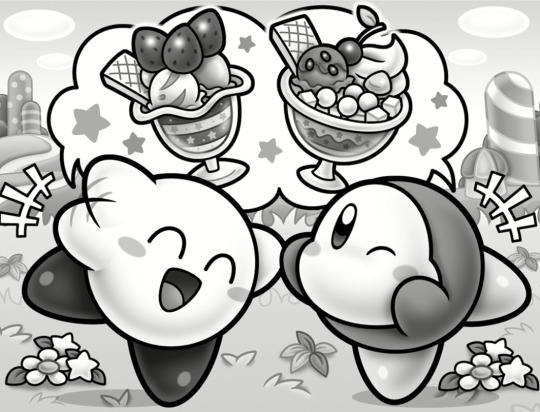
Look at them... Babies...
When Meta Knight comes into picture, I must admit, preparation for "Dedeby" and banter between Kirby, Meta Knight and King Dedede genuinely can get pretty amusing at times.
Example 1:

Example 2:
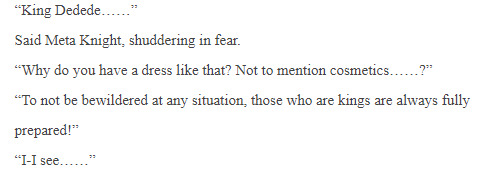
Example 3:

These are the moments that showed potential of Mie's writing. It felt like she genuinely enjoyed herself writing these characters interactions when they didn't involve mean-spirited bickering every 5 seconds or forced jokes about how much they love food.
Ultimately, this novel didn't age the best exactly.
2. The Big Panic in Gloomy Woods! (2014)

Score: 2/5.
First novel was very rough around the edges. But that's what sequels are for, right? To iron them out, to focus on the aspects that worked, to throw aspects that didn't work... Yeah, this novel didn't really do that.
Well, and did and did not at the same time. Quick summary time.
The band of frog kids that want to become "the more vile villains in the universe" decide to use Kirby's powers to get to the tastiest fruit in the universe in the Gloomy Woods all to themselves. Problem being that they don't know how Kirby looks like... So they confuse Dedede for him (since their characteristics of being very round and gluttonous are very similar). Dedede wanting to get to said tastiest fruit pretends to be Kirby.
This doesn't last very long however, as the ruse gets exposed and he gets split up from the rest of the cast, which makes him meet up with shady fellow who presents himself as the wood keeper and confusing Dedede for "a hero" wants to use his strength to get to "the starlight fruit" and mysterious "starlight crystal".
Let's start with the improvements from the last time, plot this time a bit more coherent. It still has quite useless elements, but not as much as the last novel and most of them feel like they justify certain plot-points more or less well. Climax in this novel also feels actually... Climactic instead of whatever was in the previous novel, which is also a plus.
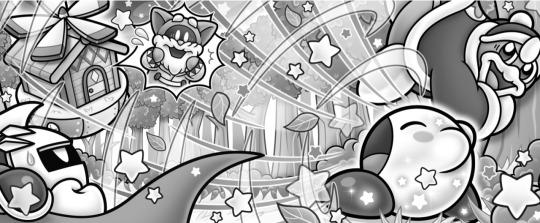
Genuinely raw illustration.
My main issue with the plot of this novel is that, considering it came out in 2014, it's essentially a tie-in to Kirby Triple Deluxe. But unlike all following novels which actually *adapt* videogame stories into novel format, this one just... Takes broad strokes of Triple Deluxe's plot and "babyfies" it.
- Kirby and Dedede get mixed up because of them being "similar".
- Dedede is confused for a hero by a main antagonist and uses him to achieve his goals (even organizing a "fight" between him and Kirby, however not through possession, but misunderstanding, because Novel Dedede at this point in time is still asshole and dumbass)
- Setting overall is nature-themed (forest and shit)
- Debut of Bell Copy Ability and Ringle
- There is miracle fruit and hypernova involved in the climax
Which on one hand helps the plot of this one feel more coherent, but on other hand it feels frustrating that instead of just straight up adapting the plot of the game (which would help rerail certain characterizations like Dedede or Kirby) they decided to do this weird roundabout approach. Another reason why I believe Mie didn't think much of these novels at first and treated them purely as books for very little kids, knowing the lengths she will go while adapting some of the later game stories.
Majority of my complaints with previous novel also still stand.
Kirby is still characterized as food-obsessed brat who doesn't do anything out of goodness of his heart but just because FOOD FOOD FOOD FOOD. He is not concerned that Waddle Dee is worried for King Dedede, he is not worried for the fate of so-called "stardust crystal", he does everything in this novel only for the sake of food. And it's genuinely, so, so, SO grating.
In this sense, it's even worse than the first novel, because first novel at the very least was very low-stakes slice-of-life sort of deal. This one attempts to to tell more "adventurous" story and it doesn't really work all that well. Not only because a lot of the story is meandering around these woods with no memorable setpieces/scenes to break up the pace, it's also because none of the characters have any "heroic" motivations per say, except Waddle Dee, of course, who keeps being only likeable characters in these books for now.
King Dedede's characterization once more suffers from the same issue as the last novel, so I don't have as much to say on it here. Admittedly he's slightly *less* insufferable than in the last novel, but it's probably purely because he gets less spotlight than Kirby this time.
Meta Knight in this one feels even more like his anime counterpart, because he essentially doesn't do anything except for dumping exposition about Gloomy Woods and the stardust fruit. Once again he doesn't do anything fighting, but at least he brought his sword with him this time, I guess.
Now, what about this novel's original characters? There's much more of them than in the last novel, after all.
Honestly, I genuinely have nothing to say about them. Their designs are... alright, I guess, the wood keeper looks like Magolor rip-off while frog kids look like Kirby anime OCs rejects.

Issue with them as characters, is that there is too much of them for this kind of story. They all kinda blend together. I don't really recall personalities any of the frog kids and all I can say about them is that they went through "redemption arc" before they could even do anything of their own agency as characters, while wood-keeper is genuinely just. Magolor-lite. Pretends to be a good dude, but lies through his teeth and wants some sort of artifact.
Only lacks any of Magolor's charisma or personality that made him such iconic character to begin with. Fairly mediocre cast all things considered and I don't see the reason why there needed to be so many new characters introduced at once.
This novel feels more competently made than the first one, but it doesn't go above it too much in terms of quality. It often faces the same faults and got a few of it's own (like being fairly poor tie-in into then recent videogame).
Though, honestly, I think I might prefer the first one over this. Why, you might say? Well... First one might be very bizarre and have unlikeable mean-spirited characterization of the cast, the fact that it's SO WEIRD makes it very memorable and it has genuinely funny character interactions at times.
This one didn't really make me smile one bit and it being more straightforward in terms of the story just made it more boring in the result. It being slightly more competent kinda removed "so bad it's good" factor first novel had going for it, so it ends just being "eh".
Ultimately, what it comes down to it, both novels aren't awful. But they are very mediocre kids books with nothing special about them.
I can see the target audience getting the kick out of them and they probably did, considering that series continued way past those two. But again, issue lies that this novel series itself proved that it can be much more than this. It can be more than mediocre kids books that sell you with colorful cover-art and familiar characters. They can be genuinely great stories with great characters that give you insight on the side of Kirby's universe you wouldn't get in the games.
But these novels don't really give you that, which is a shame. However, I'm glad that they exists. Because thanks to these two novels being a success, we have all actually good novels to read and enjoy, where all potential that shined here and there in these novels finally got to be fully realized.
However, there's really little reason to go back to this one unless you really want to read entire series through. It might just give you wrong impression and discourage you from trying reading out future installments. I recommend going back to these ones only AFTER you got into the novel series, just to see these humble roots of what became one of the most long-running tie-in Kirby series.
And to laugh at Meta Knight Blimp.
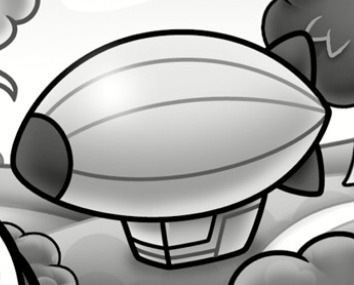
#kirby#king dedede#meta knight#waddle dee#kirby light novels#kirby light novels retrospective#gosh this is a LOT lmao#longpost
78 notes
·
View notes
Photo
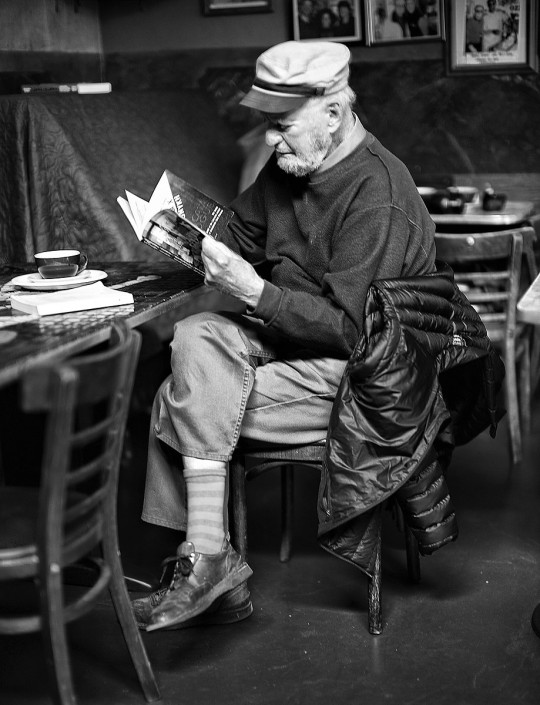
Lawrence Ferlinghetti, poet, artist, activist and founder of San Francisco’s famous City Lights Bookstore, who has died aged 101 of interstitial lung disease, was the least “beat” of the Beat Generation. In addition to a political commitment that blended anarchism and ecology – he loathed the motor car, calling it “the infernal combustion engine” – he had an instinctive business sense, founded on the philosophy of small is beautiful. City Lights, which he started in partnership with the magazine editor Peter Martin in the early 1950s, is still among the most welcoming of shops, with its tables and chairs, sheaves of magazines, and signs saying: “Pick a book, sit down, and read.”
Ferlinghetti discouraged interviewers and seekers of personal information. “If I had some biographical questionnaire to answer, I would always make something up,” he once said. Different reference books give different dates of birth, and one published story had it that he wrote his doctoral dissertation on the place of the pissoir in French literature. For many years, he listed his dog, Homer, as City Lights’ publicity and public relations officer. The poet recalled that Homer Ferlinghetti received regular mail, but that his public relations career stalled when he peed against a policeman’s leg. For this act of citizenship, he was immortalised by his master in the poem Dog.
Perhaps the facts made Ferlinghetti uncomfortable. He was born Lawrence Monsanto Ferling in Yonkers, New York, to a French mother, Albertine Mendes-Monsanto, and an Italian father, Carlo Ferlinghetti, an auctioneer, who had shortened the family name to Ferling. His parents were unable to care for him, however (sometimes Ferlinghetti said his father had died before his birth, sometimes after), and he was rescued by an aunt, Emily Monsanto. She took him to France, where they lived for his first six years. Returning to the US, Emily was employed as a governess by a family called Lawrence, a branch of the one that founded Sarah Lawrence College. “Then she left me there,” Ferlinghetti told an interviewer in 1978. “She just disappeared one day, and that family brought me up.”
His education was extensive. In the early 1940s, he attended the University of North Carolina, where a professor introduced him to the vernacular voice in poetry. This was a revelation: you didn’t have to sound like TS Eliot to write a poem. After wartime naval service had taken him back to Europe, Ferlinghetti enrolled at the Sorbonne, studying French literature while translating poets and novelists in his spare time. One day in a restaurant, he noticed that the paper tablecloth had a poem written on it, and that it was signed “Jacques Prévert”. He took the tablecloth with him as he left the restaurant, and some years later translated the poems in Prévert’s Paroles, eventually published, under the original title, by his own City Lights Books.
Back in New York again in 1946, Ferlinghetti went to Columbia University, preparing a thesis on Ruskin and Turner. He just missed meeting Allen Ginsberg and Jack Kerouac, who by then had either been banned from (Ginsberg) or had dropped out of (Kerouac) the university. Ferlinghetti did not team up with the Beats until eight years later, in San Francisco.
Drawn to Paris once more at the end of the 1940s, he met George Whitman, proprietor of the English-language bookshop opposite Notre Dame, which was first known as Le Mistral and is now Shakespeare and Company. Ferlinghetti looked to Whitman as an example when he opened City Lights Bookstore in 1953. It was the first all-paperback bookshop in the US, and, as Ferlinghetti said, “Once we opened, we just couldn’t get the doors closed.” He ran the place more in the spirit of public service than for profit, and by the 70s was content to live on his book royalties and plough the takings at the counter back into the shop.
Two years after starting City Lights, Ferlinghetti published his own collection of poems, Pictures of the Gone World, as No 1 in the Pocket Poets series, little four by five-inch, black-and-white paperbacks, which continue to appear today – one of the most popular literary lists of modern times. It was at this stage that he reverted to the original family name, Ferlinghetti. The next two Pocket Poets after Ferlinghetti were Kenneth Rexroth and Kenneth Patchen – as a result, both were drafted as “fathers of the Beat Generation”, somewhat to their displeasure – but it was the fourth in the series that ensured the list’s success. And for that, as Ferlinghetti was quick to point out, they had to thank the San Francisco police department.
The book was Howl and Other Poems, by Allen Ginsberg. Ferlinghetti had heard Ginsberg read the title poem at an event at the Six Gallery, San Francisco, in October 1955. On returning home, he sent the poet a message that consciously echoed the famous letter from Ralph Waldo Emerson to Walt Whitman after Emerson had read Whitman’s Leaves of Grass: “I greet you at the beginning of a great career.” The proprietor of City Lights added: “When do I get the manuscript?”
The book was published the following year, in an edition of 1,000 copies. However, after a failed attempt by the police to prosecute the bookseller for peddling obscene material, the reprints could not come fast enough. Ferlinghetti joked that the police “took over the advertising account and did a much better job”. Howl remains the bedrock of City Lights’ success as a publishing concern. It has now gone through well over 50 reprints, often more than one a year.
Ferlinghetti’s own poetry is irreverent, cajoling, casual and loose-limbed, sometimes excessively so. His models were Whitman and William Carlos Williams. In partnership with Rexroth, he took part in many poetry and jazz events on the West Coast, and the two made a record together. Ferlinghetti later became disillusioned with the poetry and jazz combination – “The poet ended up sounding like he was hawking fish from a street corner,” he said.
His verse on the page, though, suggests a spoken origin, as in his poem Underwear:
Underwear controls everything in the end
Take foundation garments for instance
They are really fascist forms of underground government ….
In addition to his many collections of verse, including A Coney Island of the Mind (1958), The Secret Meaning of Things (1969) and Endless Life (1981), Ferlinghetti wrote two novels: Love in the Days of Rage (1988), which is set during the student revolt of 1968 in Paris, and Her (1960), a more experimental work, a classic “poet’s novel”.
On one of his transatlantic voyages, Ferlinghetti met Selden Kirby-Smith (known as Kirby), whom he had had a passing acquaintance with at Columbia. They married in 1951 and had two children, Julie and Lorenzo, but were divorced in 1976.
In 1971, Nancy Peters, a former librarian at the Library of Congress, joined the company, and as time went on played a larger part in running the business, leaving Ferlinghetti to his creative work. She served as executive director from 1984 until 2007, and then continued to be involved as a co-owner of the business.
Ferlinghetti also had a serious interest in painting, and in 1990 the University of California mounted a retrospective. Many poems feature the names of painters, or employ a self-consciously “painterly” style, such as Short Story in a Painting of Gustav Klimt or Returning to Paris with Pissarro.
Ferlinghetti disliked being associated with the Beats, though he benefited from it, and, despite his love of Ginsberg, was apt to lament the commercialisation of the Beat Generation. Ginsberg, he said, “fabricated the whole thing out of his imagination”. But, happily contradicting himself, he could add, as late as 1996, “It’s still the only rebellion around.”
A collection of the correspondence between Ferlinghetti and Ginsberg was published in 2015, under the title I Greet You at the Beginning of a Great Career. At the same time, a selection of his travel journals appeared, Writing Across Landscapes.
Ferlinghetti expressed disappointment in other Beat writers for their unstructured approach to politics. He decided to travel to Cuba to see the Castro regime for himself and later wrote One Thousand Words for Fidel Castro, which ends, “Fidel … I give you my sprig of laurel.” Another political poem evoked a surrealistic scene by Goya, showing “freeways 50 lanes wide”, with “fewer tumbrils / but more maimed citizens / in painted cars”. In 2012 he declined to accept an award from the Hungarian Pen club, in protest at the policies of prime minister Viktor Orbán.
City Lights, open till midnight seven days a week, was Ferlinghetti’s way of infusing the spirit of resistance peacefully into the streets of San Francisco.
With Peters, he wrote a Literary Guide to San Francisco (1980), and in 1988 was responsible for the renaming of 10 streets after writers associated with the city, including Jack Kerouac Alley, partly composed of City Lights’ back wall. In 1994, he himself was similarly honoured by Via Ferlinghetti, the first time a street has been named after a living writer in the history of the city.
He is survived by his children and three grandchildren.
• Lawrence Monsanto Ferlinghetti, poet, artist and bookseller, born 24 March 1919; died 22 February 2021
Daily inspiration. Discover more photos at http://justforbooks.tumblr.com
20 notes
·
View notes